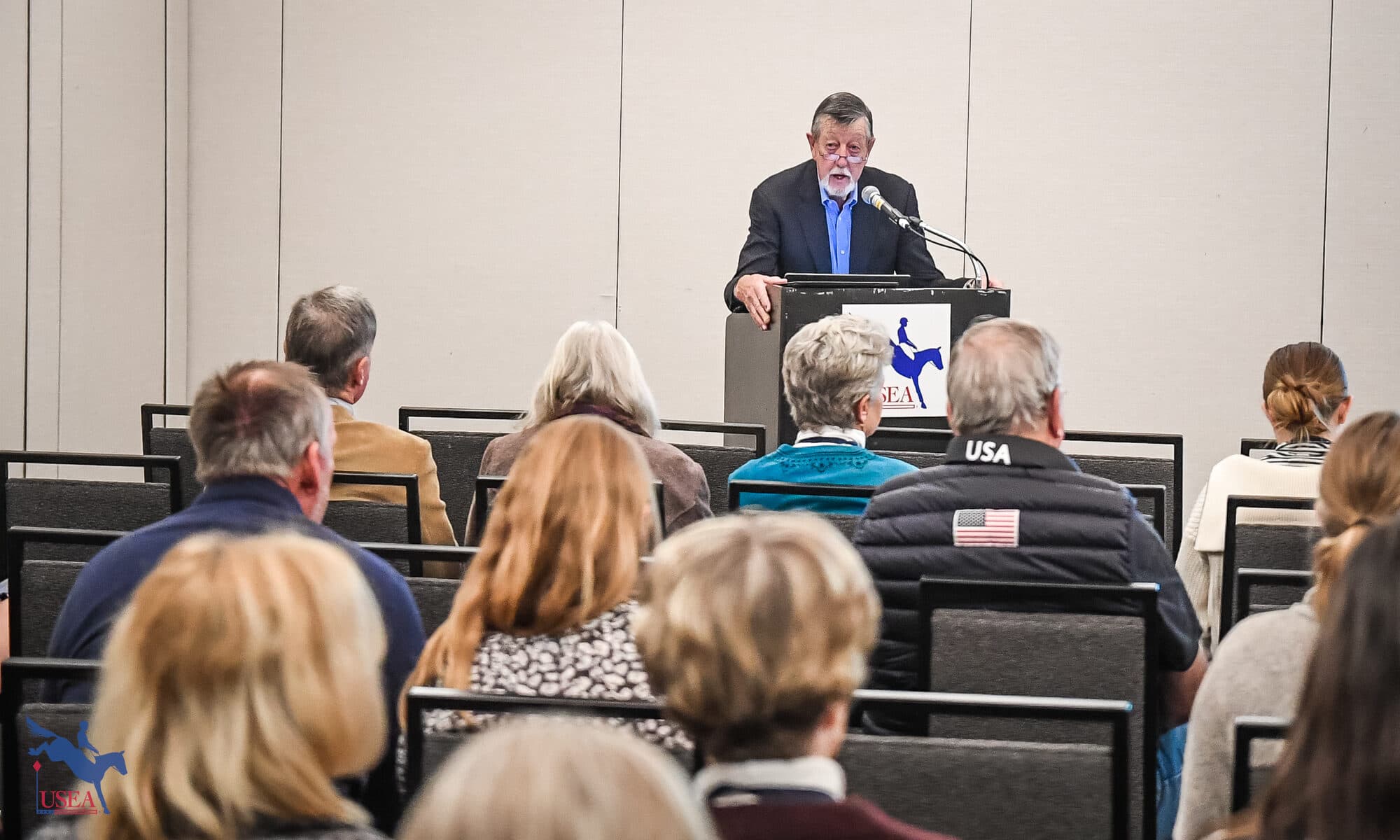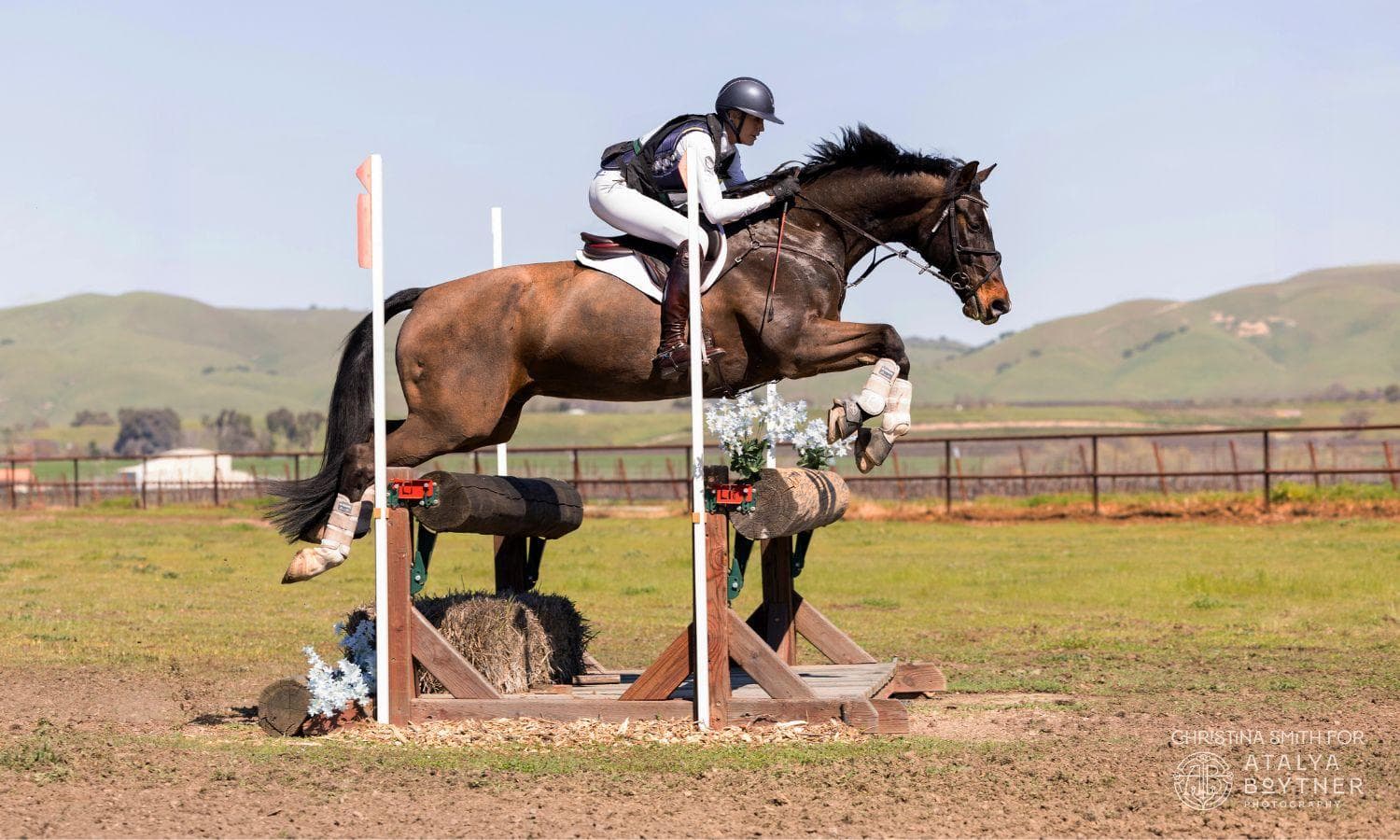Members Debate and Discuss Rule Change Proposals at 2023 USEA Annual Meeting & Convention

Several rule change proposals were up for discussion during the Rule Change Open Forum at the USEA Annual Meeting & Convention, held Dec. 7-10 in St. Louis, Missouri.
Malcolm Hook, member of the Competitions, Calendars, and Rules Committee (CCRC), moderated the discussion in front of a packed crowd on Saturday. There were 14 eventing-specific rule change proposals (RCP) and six general RCPs that have not yet been approved.
The eventing-specific RCPs will be considered by the USEA Board of Governors at their January meeting, where they’ll decide if they’ll go forward to the U.S. Equestrian Federation for approval.
If approved by the USEF Board of Directors at their June 2024 meeting, these RCPs would go into effect Dec. 1, 2024.
Hook encouraged audience participation and reminded the audience that they can send in their feedback on any RCP via the rules feedback portal on useventing.com, which closed on Dec. 11.
The 2024 rulebook went into effect on Dec. 1, 2023 and can be found here.
To view a full list of RCPs, click here.
EV104.8 intends to add clarity to a horse’s performance record and assist the ground jury in making decisions regarding granting a competitor permission to ride in subsequent phases after a technical elimination (TE). A recorded TE would be the fault of the rider (i.e. omission of obstacle, third error of course in dressage, or missing start or finish flags), not caused by a horse’s aberrant performance.
EV122 and EV122.5 would remove the confusion of elimination at the national level for either retaking a jump or continuing. It aims to be consistent with the FEI wording and definition of a missed flag and a run-out.
A change to Appendix 3 – Participation in Horse Trials would allow for the first activation of a frangible device (11 penalties) or having one missed flag (15 penalties) as an MER. This would align with FEI rules.
USEA members Katie Murphy, Melissa Alaimo, and Linnea Ackermann proposed a change to EV108 – Participation. It would restrict horses to compete no more than three consecutive weekends.
They’ve noted that within Area I there have been numerous concerns regarding competitor and horse safety. Competitors and volunteers have witnessed horses competing extensively in multiple back-to-back competitions in addition to schooling shows and other venues. They hope their RCP would ensure the well-being of horses in situations where the owner and/or rider does not practice mindful care, does not abide by professional recommendations, and where professionals don’t speak to the concern of the horse’s well-being.
The RCP generated much discussion within the group. Some people, including Hook, thought the rule would be unenforceable. Others wondered if organizers would be responsible for enforcing the rule.
Some questioned how it could be effective with people who compete in unrecognized events.
“I would just question the difference between compete and complete,” said David O’Connor. Would an elimination for lameness in dressage count as one of three events in a row?
Another change to Appendix 3 – Participation in Horse Trials, also proposed by Murphy, Alaimo, and Ackermann, would require additional Minimum Eligibility Requirements (MERs) for moving up the levels and is intended to “support the well-being and safety of the horse and competitor.”
Currently, MERS are required for Modified, Preliminary, Intermediate, and Advanced levels (except for Classic Three-Day Events) for horses and competitors to move from one level to the next.
The RCP would require the competitor and horse at Training to achieve two MERs at Novice or higher, and for Modified, the horse and rider must achieve three MERs at Novice or higher.
Currently, there are no MERs required for Training, and Modified requires an MER at two Training level or higher events.
Some in the audience noted that many professionals are able to safely bring a horse out at recognized Training level after competing unrecognized at the lower levels, and many amateurs will compete unrecognized Beginner Novice, Novice, and Training before moving up at a recognized show, so this RCP would penalize them both time-wise and financially.
“I think it’s reasonable when you have a very serious trainer who knows that they’re doing to bring a horse out at Training as their first recognized, and I think in terms of the people who are relatively new to the sport who may be competing at unrecognized because it’s cheaper, less expensive, more friendly, whatever the reasons are, they’d be competing Starter, Beginner Novice, Novice, Training. There’s an incentive to them to say, ‘Well, I’m not going to bother going to go Training at a recognized, I’m just going to stay unrecognized,’ and that’s going to lose our entries,” said Janet Gunn, a technical delegate and competitor from Area II.
“When we first created the concept of MERs and revamped what used to be the qualification system, our intent was very clearly not to extend it too far down the levels for the very reasons Janet said,” Hook said. “An experienced rider might get a horse out of the jumper ring where it’s been jumping 1.20-meter or 1.30 and take it around cross-country to see if it likes it, then want to move it right up to Training and start it. There’s no reason they shouldn’t be able to do that. I think the current structure of MERs and starting where they start continues to make sense for the sport.”
Two general RCPs generated some discussion.
GR150 Official Video (Track 078-23) would eliminate the current confusion surrounding when video can be used in rendering decisions, and if permitted, what video footage is permitted to be used. Currently the USEF’s general rules are silent on the issue. If passed, the rule would limit video to official video footage only.
Judges would be barred from using anything other than official video footage to review field of play decisions. If they are allowed to view other video footage under specific breed or discipline rules, it must be unaltered.
Hook said that CCRC is working on language for an eventing-specific rule. “Many events don’t have an official videographer,” he said. “Fences judges frequently take film of incidents that happen. Fences judges are, in that regard, in our view, sanctioned by the event because they are an extension of the officials. Video should be reviewable by the ground jury in the event that there’s a dispute. This is one of the things that’s going to be talked through with [USEF.]”
Hook said the way the eventing-specific RCP has been written, the ground jury and technical delegate, in their sole discretion, may decide to accept submitted video as authentic and accurate, such as a video a parent or spectator has taken.
GR702 Violations (Track 082-23) would ensure USEF jurisdiction over members’ conduct relating to cruelty or abuse outside the competition environment.
f. Physical assault upon a person and/or cruelty and abuse to a horse as defined in GR838, whether such conduct occurred at a licensed competition or at any other time.
This would be a big change, according to Hook. Licensed official Sally Ike spoke up, saying she was in attendance at the U.S. Hunter Jumper Association’s annual meeting earlier the week, and there was a lot of discussion on the RCP.
A USEF attorney was there and said the Federation had the authority to sanction members outside of competition grounds, and USHJA was going to recommend it be approved.
O’Connor pointed out incidents like the Andreas Helgstrand dressage scandal, in which an undercover groom provided video of abuse and cruelty at Helgstrand’s Denmark farm for a documentary crew. Helgstrand has now been banned by his national federation from competing on national teams.
“The worry is that the federation is going to go around with cameras and come into your barn,” he said. “That’s not the intention. The intention is if something is brought to them. Then if you think about the legal process under New York law that the Federation has to go through, which is proof of evidence and checks and balances, including a guaranteed hearing—somebody can dispute their side of the equation—that in those checks and balances systems, the Federation would still have the ability, if it got through the process, to sanction someone.”
Helpful Links
- Convention Webpage
- USEA Coverage
- Schedule
- Registration
- Vendor List
- 2022 Annual Meeting of Members Minutes
Don't forget to follow the USEA’s event coverage on social media!
Facebook | Instagram | Twitter
About the USEA Annual Meeting & Convention
The USEA Annual Meeting & Convention takes place each December and brings together a large group of dedicated USEA members and supporters to discuss, learn, and enjoy being surrounded by other eventing enthusiasts. The USEA organizes multiple seminars in addition to committee meetings, open forums, and tons of fun! The 2023 USEA Annual Meeting & Convention will take place in St. Louis, Missouri, on Dec. 7-10, 2023. Click here to learn more about the USEA Annual Meeting & Convention.
The USEA would like to thank the USEA Annual Meeting & Convention Sponsors: Adequan, Bates Saddles, Capital Square, D.G. Stackhouse & Ellis, Kerrits, Horse & Country, Nunn Finer, Nutrena, Parker Equine Insurance, Rebecca Farm, RevitaVet, SmartPak, Standlee, and World Equestrian Brands.















